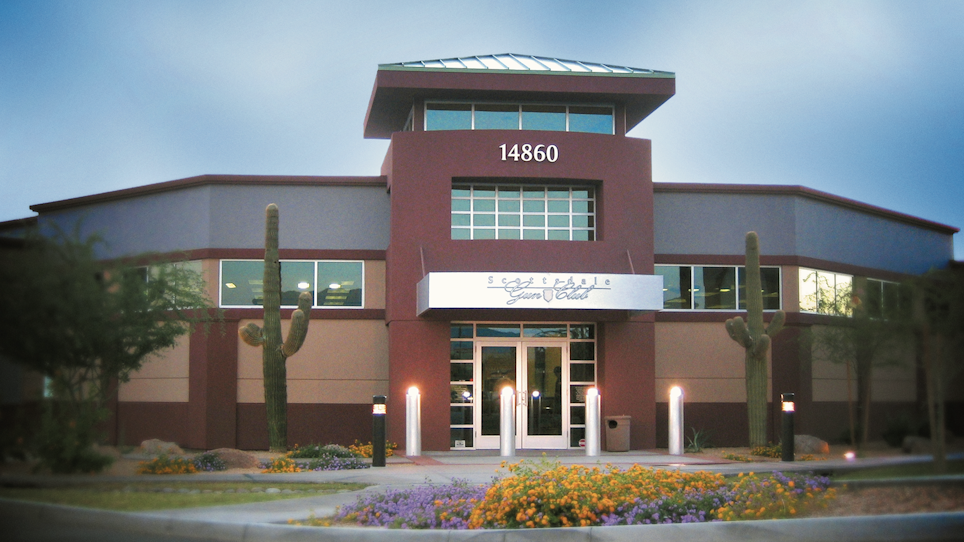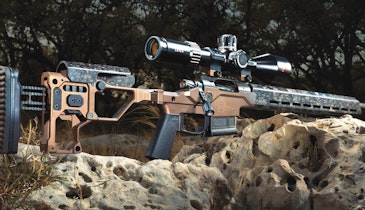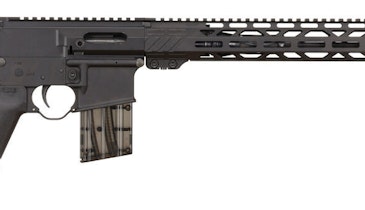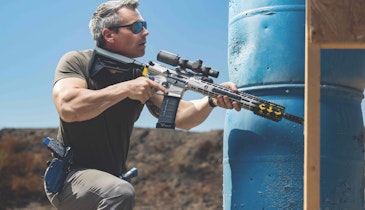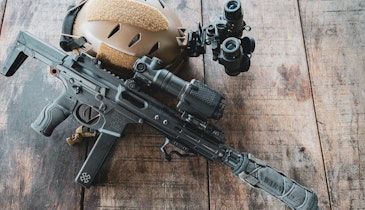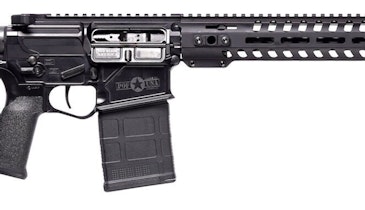For gun store owners it’s simple: If you don’t cover yourself, you could lose everything.
You can’t operate a gun store without insurance coverage, especially if you have a loan to repay. Your store may do things a little differently than other stores, so you need help from a knowledgeable insurance agent to make sure you get the coverage you need. While this article is not legal or insurance advice, it will help to clear up some of the mystery.
Why Do I Need It?
If your store burns, even if it isn’t totally destroyed, repairs and cleanup will be expensive. More expensive than you probably think. Smoke and water are deceptively destructive, so even if the flames don’t touch some parts of the building or your inventory, repairs or cleanup will probably be needed. And if you have a mortgage or loan, your lender is going to insist that you carry property insurance.
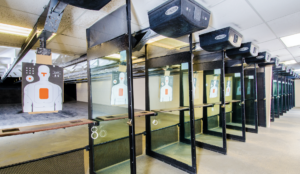
Indoor and outdoor shooting ranges introduce another set of exposures to loss for a gun store. A good insurance company can help you identify those potential causes of liability losses and provide coverage to protect you from them. (Photo courtesy Scottsdale Gun Club)
Jack Napier, claims manager for Joseph Chiarello & Co., an agency specializing in insurance for firearms businesses, points out that some store owners think all they need is insurance on the store and its contents, but are ignoring what is possibly a much bigger exposure. If a customer is injured in your store, it could put you in bankruptcy, even if it’s just a simple slip and fall. A five-figure legal bill plus an award to the injured party is not unusual, and can easily grow to six figures or more. Napier has seen stores without liability coverage go out of business due to a large claim.
And if you, as a gun seller, think that if anyone is injured by a gun you sell that the manufacturer will automatically take responsibility and defend you against a claim, you are flat wrong. Napier points out that some gun manufacturers are no longer in business. Have you ever heard of Jennings Firearms or Lorcin Engineering Company? Both made firearms and both are no longer around. Other companies have also disappeared.
If you sell used guns, the manufacturer may have no obligation to defend you or pay any judgments, especially if modifications have been made to the gun or it was worked on by a gunsmith. And even if you sell only new guns made by well known manufacturers, the gun maker still may not defend you and in fact, depending on the circumstances, may try to shift all the liability for a loss to you. It’s just impossible to predict what could happen.
Property Insurance
Property insurance, sometimes called fire insurance, protects the insured — the owner or renter of the property — from losses caused by fire, windstorm, hail and usually a variety of other perils. But within this broad category of insurance, a variety of coverages are available that can be very important to the life of your business.
One of those is business interruption coverage, which comes in several forms. Generally it covers the insured for ongoing costs that don’t stop just because the store is closed while repairs are made. Examples might be the rent that continues even though you aren’t selling guns. Or you may have a valuable employee that you can’t afford to lose to another gun store, but whose salary you can’t afford to pay while you aren’t making money. You may be able to buy payroll coverage for that.
Did you know that even if you have property coverage, the guns belonging to a customer on consignment or being worked on by your gunsmith may not be covered if they are stolen or damaged in a fire? But coverage for property of others in your care and control can be purchased.
There are other property coverages, but you’ll need a good insurance agent to help you figure out what is available and determine if you need it.
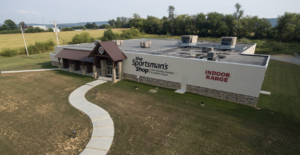
Whether you rent or own the building you occupy, property insurance coverage may be required by any bank which lends you money to fund your operation or holds a mortgage on your property. (Photo courtesy The Sportsman’s Shop)
Liability Insurance
The second broad category is liability insurance, sometimes called casualty insurance. It covers the insured if legally liable for injury to someone or damage to property belonging to someone else. And remember, even if you do nothing wrong, you can be sued. It happens all the time. Your purchase of insurance buys you peace of mind, because the insurance company promises to defend you and pay any damages you owe for a covered claim if you are negligent or have a judgment against you.
An important feature that your insurance agent should explain to you is the difference between a “claims made” and an “occurrence” liability policy. Claims made policies cover claims made only during the policy period, and the accident or occurrence must take place after a certain date called the retroactive date, which could be the effective date of the policy or even an earlier date. Occurrence policies cover claims made at any time as long as the occurrence happened during the policy period. So if a claim is placed 30 years after the policy expires, it is still covered. Occurrence policies are generally more favorable to the insured than are claims made policies.
If you buy an occurrence liability policy, your insurance agent should help you find an insurance company that is likely to be in business and able to honor your claims years after the policy was written. And it’s a good idea to keep all your old insurance policies in case something happens years later and you need the company that issued the policy to step up and handle a claim.
Pricing
There is no doubt that insurance premiums are significant, but they are a necessary cost of doing business. Prices can vary from insurance company to insurance company, so getting competitive quotes can save you money. Keep in mind though, that competition between insurance companies tends to keep premiums as low as possible. Sometimes premiums are so low though that companies go out of business.
Setting insurance rates is tricky. One problem, especially involving liability insurance, is the fact that claims may not appear until years after the policy expires. During that time, inflation, costs of repairs and other factors may have caused the price of settling a claim to be much greater than when the policy was sold.
Rates may have been adequate to cover expected claims in the beginning, but years later it turns out that the policy was under priced. And, as stated before, insurance companies sometimes become insolvent, are not be able to pay claims and go out of business. This happens despite the oversight of state insurance departments to make sure premiums are not excessive, yet are adequate to keep companies solvent.
Agents and Companies
Another important point when buying insurance is to deal with a knowledgeable agent who can help you get not only the right coverage, but select an insurance company that will be able to pay claims in the future. So look for an experienced agent with knowledge of your business and how to properly insure it.
Time in the business and specialization are two characteristics that can help you pick the right insurance agent and insurance company. As mentioned earlier, Joseph Chiarello & Co., Inc. (JC&C), located in Summit, New Jersey, is an insurance agency specializing in coverages for businesses in the firearms industry including retailers, wholesalers, distributors, manufacturers and other operations. It is a third-generation, family-owned agency with Joseph J. Chiarello II in charge.
About 40 years ago, JC&C developed a special insurance product, or program, for the gun industry with American International Group (AIG), a large insurance company. AIG has partnered with JC&C since, so it appears that the company is loyal to the business and has demonstrated its willingness to stand through thick and thin.
Some readers will recall the efforts of gun control advocates and municipalities in the 1990s to bankrupt gun manufacturers with lawsuits alleging that the manufacturers were liable for increased costs of emergency services and for injuries suffered by people at the hands of criminals using guns. Instead of walking away, AIG defended against the lawsuits and never lost, even though for technical and legal reasons AIG was not obligated to. That’s unusual to say the least and it cost AIG millions of dollars in legal bills. Eventually, federal legislation was passed to protect manufactures from those frivolous lawsuits.
According to Joe Chiarello, not all insurance companies will sell insurance to gun businesses, and of those that do, some will not insure retailers who sell modern sporting rifles — AR-15s. But JC&C and AIG have no such restriction. Both have proven that they are in the gun insurance business for the long haul, which should be an important consideration because other companies have gotten into the business and then left it. Keep that in mind if suddenly an insurance agent presents to you a policy with a premium that is dramatically less than what you have seen in the past.
Another tip; no matter how enticing it might be to withhold information from your insurance company to reduce your premium, do not do it. If you do and you have a claim or loss, the insurance company will find out and may have the legal right to deny coverage. It is much better to get any disagreements or misunderstandings resolved before the policy is written than to have a claim the insurance company refuses to pay.
Perhaps you already have an insurance agent and do not want to switch to another agent. JC&C will work with any competent and licensed agent to provide the right coverage for your business.
For more information, contact Joseph Chiarello & Company (www.guninsurance.com) by email at info@jcinsco.com or call 800-526-2199.
Doug Larson is a former Contributing and Field Editor for Guns & Ammo magazine and has completed hundreds of hours of firearm and self defense training provided by some of the finest world class gun fighting schools. He also spent nearly four decades in the insurance business in a variety of roles including underwriting, product development and claims handling. He is a Chartered Property Casualty Underwriter (CPCU) and holds an MBA degree.
Featured image: Courtesty of Scottsdale Gun Club
